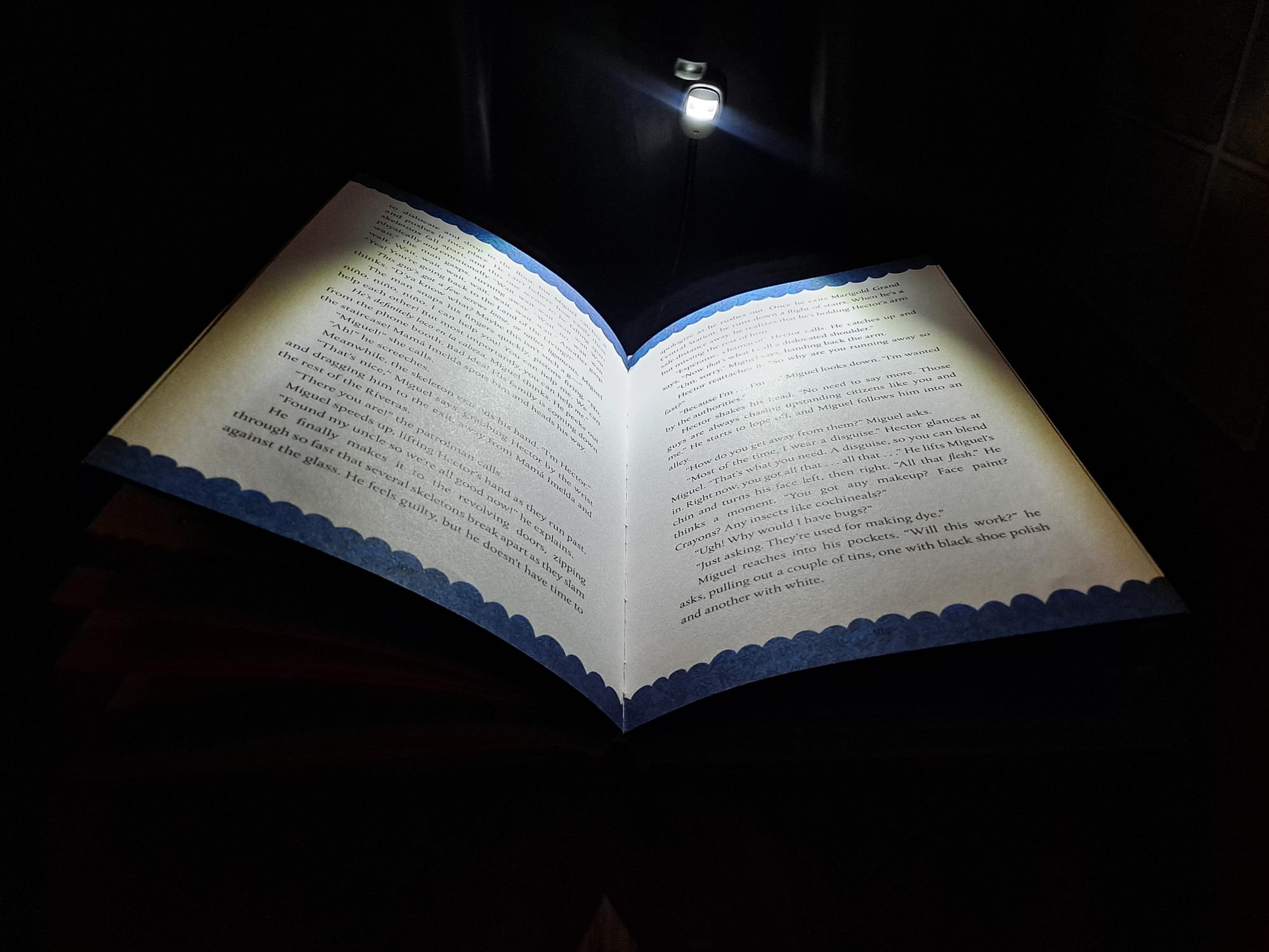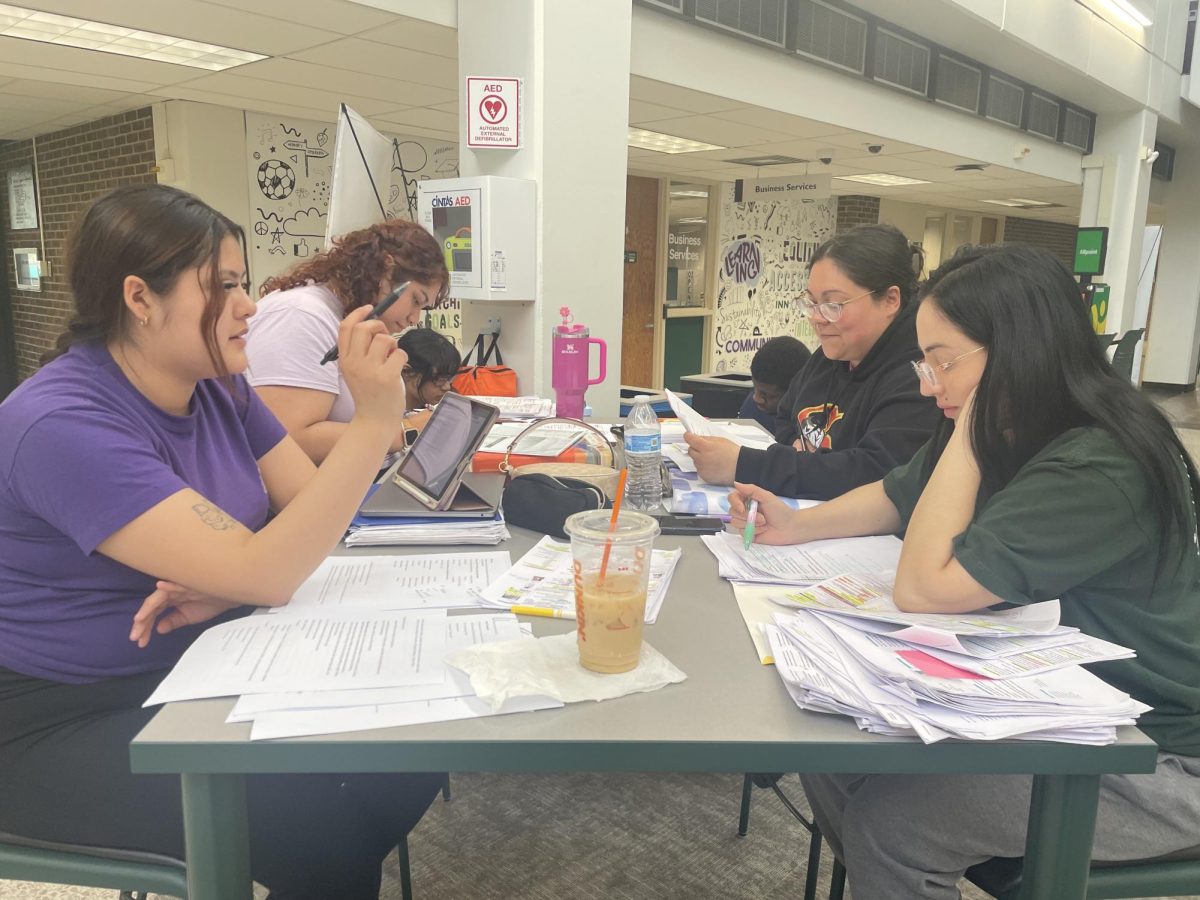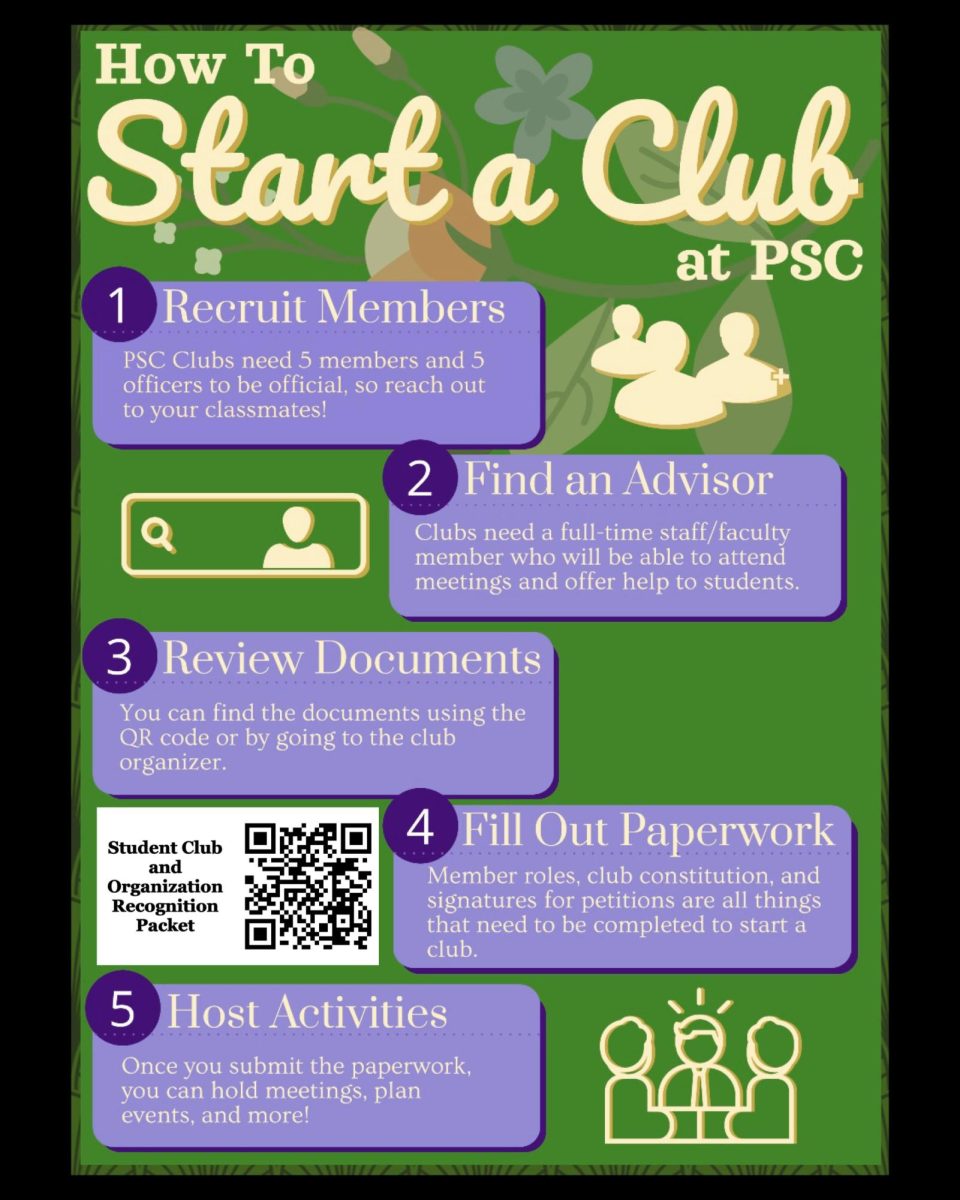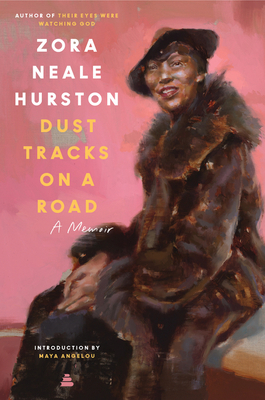The cost of textbooks has increased over 1,000 percent within the last 40 years, and “[t]extbook prices are rising roughly 3 times the rate of inflation,” according to the Education Data Initiative.
Barnes & Noble claims its new textbook sales programs will “remove barriers from higher education by improving access, affordability and convenience” as stated on the Barnes & Noble College website. The Book Bundling program, according to the PSC website, helps students “Save 35-50% on the cost of course materials each term”. The bookstore chain plans to expand the program to all of its institutions by 2025.
What is Book Bundling?
Book Bundling is also known as “First day Complete” or “Inclusive Access” and, to some critics of the program, it is called “Automatic Textbook Billing”. The charges for the textbooks are added automatically to the student’s tuition, hence the name.
At PSC, Barnes & Noble implemented the Book Bundling program for the 2024-25 academic year under a one-year contract. The program prepares students’ course materials for the first day of classes by placing all of the students’ materials in a bundle to be either picked up at the bookstore or delivered.
Students in the program only have the option to rent, not buy, materials and are charged $25 per credit hour, including courses that have low-cost or no required materials. For a 12 credit hour schedule, students are being charged $300 for the total cost of materials. The charges added to a student’s tuition and fees are visible on a student’s Pioneer Portal.
Students have the option to opt-out of the program by navigating to the PSC website to the ‘Frequently Asked Questions’ section, under the 7th question “Can I opt-out of the program?”.
According to the federal government, students must have the right to opt-out of programs like these. As stated in the 2015 Federal Department of Education, the charges for materials can be included into tuition and fees as long as the institution “[h]as a policy under which the student may opt out of the way the institution provides for the student to obtain books and supplies” [paragraph (c)(2)(i)(C)]. The department obligates institutions to allow students to opt-out of these types of programs, but does not specify how or if institutions can communicate to students the way to opt-out.
William Condon, dean of learning resources and assessment, shared that the library surveyed students about their perspectives on book costs before PSC implemented the program. Along with being asked of the prices they’ve paid for course materials, students were asked, “If PSC participated in a program where each student is automatically charged the same flat fee for course materials in order to have access on the first day of class, would you opt in?”
The majority of students approved of the program, with 69.1% interested and 30.9% not. However, the specifics such as the “flat fee” amount, eligibility, or how to receive materials were not provided. In addition, the question asked if students would “opt-in” to the program if it were offered. However, this program is designed to automatically enroll students and have them individually opt-out. Students who approved of the program likely were not aware that the billing would be automatic.
Concerns Surrounding the Program
The Biden-Harris Administration aimed to stop textbook charges from being automatically rolled tuition charges without student consent. According to the White House Archives website, in a 2024 press release, archived after Trump’s inauguration, the Biden-Harris Administration expressed that students would not have much ability to search for other profitable options when fees made for materials are included in tuition. The press release states, “Colleges are also currently allowed to automatically charge students for textbooks if the charge meets certain criteria. Students are often unaware of this hidden cost or their ability to decline the charge, preventing them from shopping around for a better price.”
Savings Claims Inaccurate, For Some Students
Barnes & Noble claims that students “Save 35-50% on the cost of course materials each term” in the selection emails and the PSC website. However, according to Dr. Little, the statistic pertains to the program in general, not from PSC-related results. In addition, the statistic does not inform students that the default is to rent materials, not purchase them.
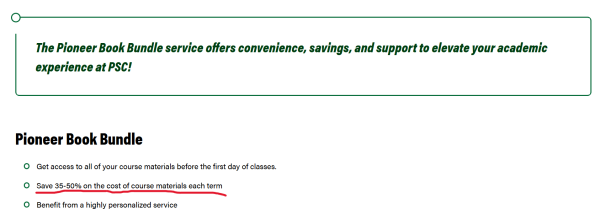
For some, the promised cost savings may not be accurate. The program may charge them more than what the total cost of materials are worth –especially considering courses with no required materials or some that are at low-cost– if bought or rented elsewhere.
Some Students Not Saving 35-50%
The items in the table below represent actual student self-reported Spring schedules and materials. All of these students have at least one course that did not have any required materials, and none of them would save 35-50% by staying in the program. The “Lowest Total Opt-Out Cost” in the table reflects the cheapest possible options and includes purchasing or renting, new or used, from Barnes and Noble or elsewhere. The Pioneer staff confirmed the materials and costs through the Barnes & Noble course material lookup, along with confirming the credit hours for each course.
See more detailed information on each student’s required course materials and lowest cost option.
Some students would benefit from renting or even buying new materials from the Barnes & Noble bookstore rather than remaining in the program. For example, Student B’s Book Bundling flat rental fee is $300. Meanwhile, to buy new materials from Barnes & Noble would cost them $149.98, nearly half of what the program charges them. To rent used materials from Barnes & Noble , this student would only need to spend $71.25.
Similarly, Student C’s flat fee is $325. However, for the one class that requires materials, purchasing them new from Barnes & Noble after opting-out would cost the student $120. Student C would pay nearly three times the amount if remaining in the program.
On the other hand, Student F would benefit from the program. Student F would spend $377.86 outside of the program while the bundle flat fee is $325. Student F would be saving $27.86, if they participated in the program. Although Student F benefits from the program, this student does not save the promised 35-50% as the Book Bundling PSC page claims. It’s clear that some students will save significantly by opting out and shopping the “opt-out” materials online on the Barnes & Noble website, although they are not guaranteed these lower prices. Upon checking out, students are advised that, if purchasing a used textbook, the final price may be higher if the used version of the textbook is not available. This also makes it hard for students to estimate their costs and understand the options.
Lack of Clear Information
Nonprofit organizations, such as SPARC, have raised concerns about these textbook programs as well. The U.S. PIRG Education Fund (an organization that “works to protect consumers and promote good government”) states in “Automatic textbook Billing: An Offer Students Can’t Refuse?”, of 52 contracts reviewed, 42% of institutions signed at least one contract that limits the institution from providing information about the program to students and administration, including information on how students can opt-out of the program. This review included contracts from five publishers, three vendors, and two bookstore chains, one of which was Barnes and Noble.
Despite student confusion and the lack of flyers around campus, PSC Announcements sent out an email in the Fall semester on Aug 15. The email informed students of their right to opt-out and provided the link to opt-out and the PSC Book Bundling FAQ page. Similarly, if students had Desire2Learn (D2L) email notifications enabled or checked D2L announcements , they would receive information on how, exactly, they could opt-out. Many students who had missed these announcements and notifications were likely directed to the FAQ page on the PSC website as the main, if not only, source of information.
FAQ: Hard to Understand
The PSC Book Bundling page displays the basics of the program including the basic process students take while in the program, also making no mention of the right to opt-out. Farther down the page, users see the FAQs that explains the Book Bundling program in detail using drop-down menus. However, communication experts discourage the use of FAQs and accordions in certain situations.
The Plain Language Action and Information Network (PLAIN), a website of The U.S. General Services Administration that “supports the use of clear communication in government writing” had a page dedicated to effective use of FAQs, or “Frequently Asked Questions”. Titled “Avoid FAQs”, the page advises that content should be simple to read. In addition, the page recommends people to “Supplement your main content with FAQs, but don’t try to replace the main content.” However, the only place where the Book Bundling Program is described is on the FAQ page.
The Nielsen Norman Group, a group of web user experience experts, explained in the article “Accordions on Desktop: When and How to Use” that accordions can “increase interaction cost,” especially if all accordions or the “expand all” option have to be clicked in order to see the full picture of the Book Bundling Program.
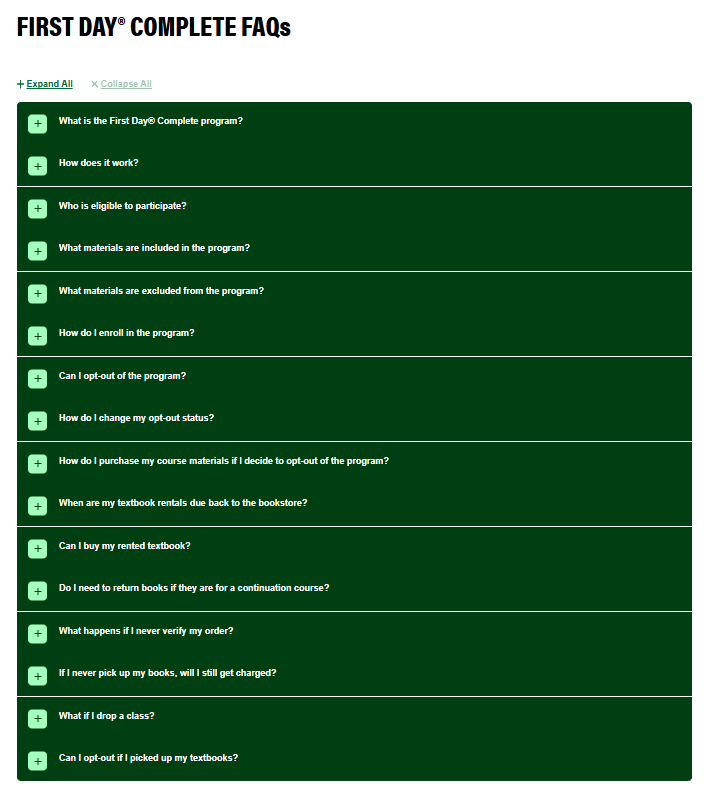
A Close Look into Barnes & Noble Emails
Bookstore manager, Brittany Zook, commented on the communication to students from the Fall semester: “I’m not sure if enough communication went out. Because I know, as a student, I know I wouldn’t be reading my emails over the summer… for the most part, if we were able to have, like, another way of communication instead of just the email, I think that would’ve helped a little bit more for the program.”
Although students may not read their emails before the start of a semester, the emails themselves do not provide the process of opting-out, which is a student right.
The selection emails sent to students prior to the start of classes explain that students must make the choice of whether to have the bundle delivered or picked up from the bookstore. However, the emails do not provide information on how to opt-out or inform students that they even have the option to opt-out. In addition, the emails prompted students to make the decision to pick up or ship materials without delay, creating a sense of urgency without providing the important information on opting-out.
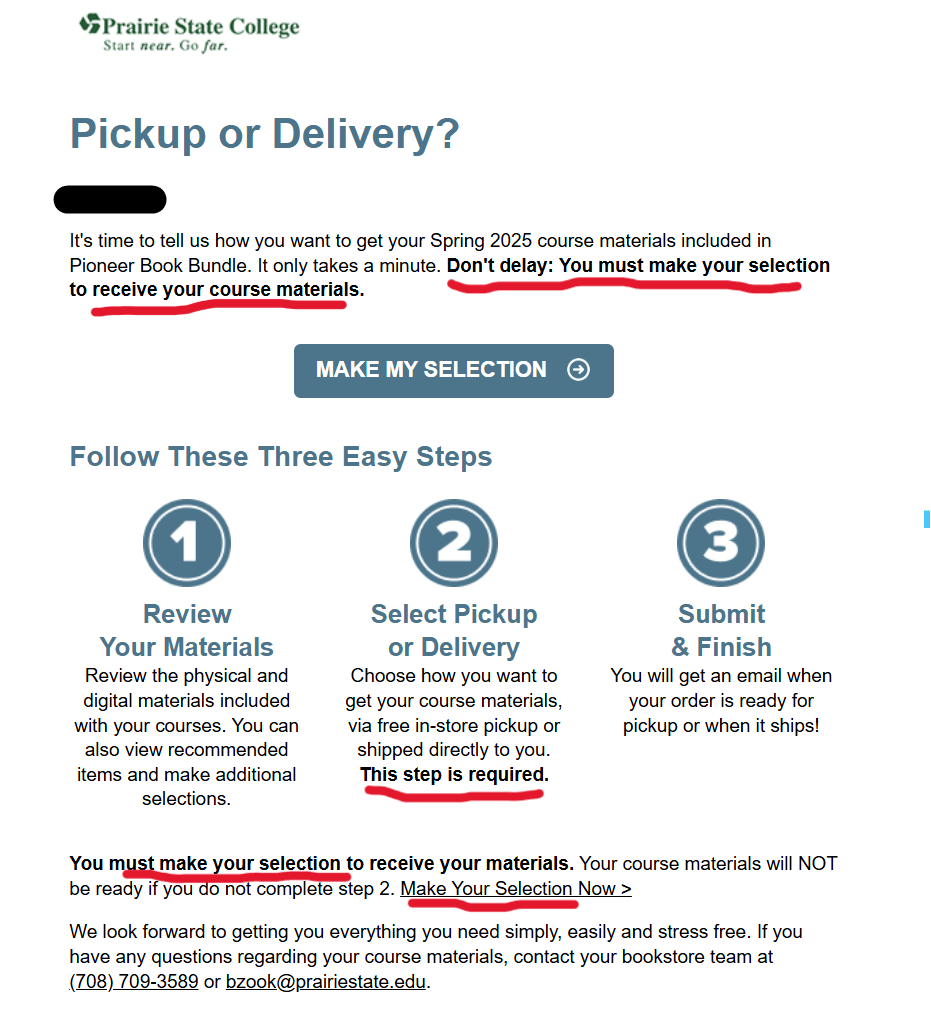
The PSC website states, if a student does not opt-out and never picks up their materials, “physical materials will be held at the bookstore, digital materials will be accessed through the LMS and the student account will be charged.” Although the program is designed to save students money, students will still be charged the amount of the bundle for not making any decision, not reading emails, or, simply, forgetting to take action.
Data on the numbers of students who did not respond to the Barnes and Noble selection email and who did not receive the materials were asked of Grace McGinnis, dean of enrollment management, and Brittany Zook, bookstore manager, but no data was made available at the date of publication.
Emailed Confirmation
After students make their selection to receive their materials, they receive an email confirming their choice. The email lists the student’s materials, the format of the item, as well as the return date. However, under the “Total Price” of the individual item, it states that it is “Prepaid”. In addition, beneath the “Order Summary”, the items appear to be free for the subtotal, tax and shipping.
While the order and program may seem free, upon looking in the Pioneer Portal to the tuition, the charges for the bundle are included. The program may seem free upon single glance, but the charges are rolled into the student’s tuition.
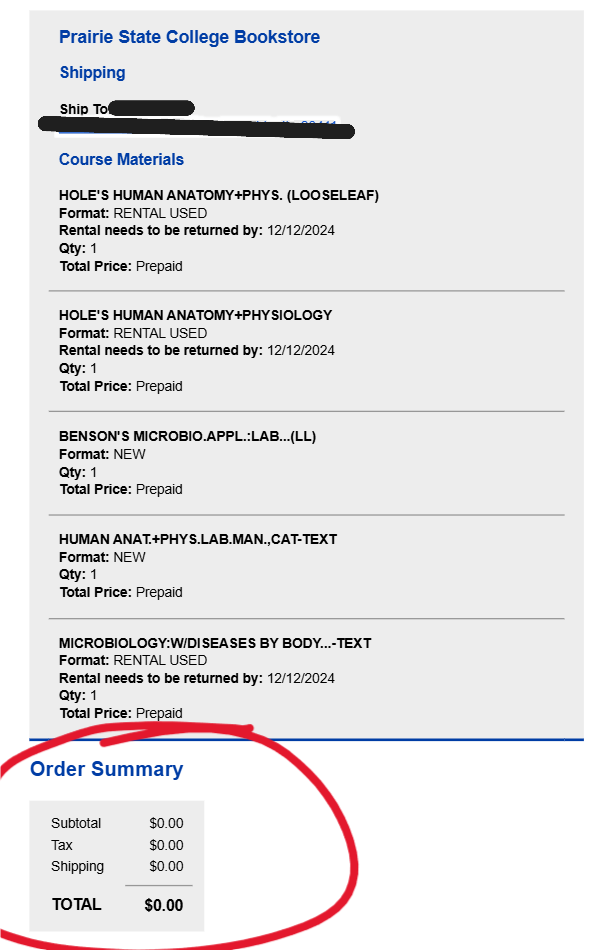
Syllabus Statement from Barnes & Noble
Prior to the start of the Fall ‘24 semester, faculty were sent a First Day Complete Faculty Kickoff Guide giving instructions on the basics of the program. Barnes & Noble asked faculty to include the following “Student Instructions” to their syllabus:
This course is part of our course material delivery program, Pioneer Book Bundle. The bookstore will provide each student with a convenient package containing all required physical materials and all digitally delivered materials for this course will be integrated into D2L.
You should have received an email from the bookstore confirming materials provided for each of your courses and asking you to select how you would like to receive any printed components (in-store pick up or home delivery). If you have not done so already, please confirm your fulfillment preference so the bookstore can prepare your materials.
For more information about Pioneer Book Bundle, please go to
https://prairiestate.edu/student-services/college-bookstore.aspx.
This syllabus statement emphasizes that students must select their manner of receiving materials, yet the statement makes no mention of a student’s right to opt-out of the Book Bundling program or the deadline to opt-out. The selection emails also do not supply this important information. The syllabus statement appears to include a link to the PSC FAQ webpage that contains the opt-out information. However, unlike other links provided in the guide, the FAQ link is not hyperlinked and, when copied and pasted into a web browser, it appears as an error message.
Problems with Opt-Out Deadline for 12-week students
The deadline to opt-out was Feb. 10, 2025, according to the FAQ. This gave students with 12-week classes that began Feb. 7 very little time to learn to determine cost savings, meet their professors, and decide whether the course materials are truly essential to the course or if they are optional. This could lead to students making uninformed decisions. The Fall opt-out deadline of Sept. 16 presented the same issue, with students in 12-week classes having very little time.
However, according to Dr. Little, when asked about the opt-out process for Fall semester, he stated that students who were taking classes that began near the deadline were able to opt-out and receive the money back by going to the bookstore. “In the event that … the deadline has passed, then you simply go and you talk to the bookstore and they reverse the charges,” he said. In addition, Brittany Zook affirmed this process. Yet, the FAQ presented in the PSC website does not mention this process.
Unclear How to Acquire Materials after Opting-Out
On the FAQ, under the ninth Frequently Asked Question “How do I purchase my course materials if I decide to opt-out of the program?” It states, “Students will be responsible for purchasing their required course materials through the bookstore.” This makes it seem as if students must purchase their materials through the bookstore, not elsewhere.
In many cases, purchasing materials from outside resources, or opting out and renting from the Barnes & Noble bookstore, could possibly be more affordable.
Student’s Thoughts on Changing the Program
Students have expressed their opinions on how to make the program better, not just for themselves, but for the people who did not benefit from the program.
Jamel Conner, a photography major, stated, “I do not understand how the BBP [Book Bundling Program] is currently benefiting me this semester. (…) I am not sure what exactly I am paying for.” For Jamel, he could have made a better financial decision if the program was better communicated to students.
Caleb Avila, a pre-nursing major, was in the program for the Fall ‘24 semester thinking that he was saving money. In actuality, some of the materials in his bundle were not required by his professors. He believes that the program is “way too complicated of a process to get this information, let alone for an average student, to find any of this out.” Had he been able to gather sufficient information from the program and his professors, he would have saved money.
Sabrina Boothe, first-year pre-nursing major, believes that the program should not automatically enroll students into the program: “I think the program is good if you are taking classes where you need several textbooks, but I don’t think everyone should be automatically enrolled in it. I think it’s something that somebody should be able to voluntarily enroll into ‘cause that’s something that could easily be missed and then you don’t opt-out, you don’t use it, and you get charged for it.”
Similarly, Idaline Muro Castaneda, an animation major, thinks that the program isn’t advantageous to students. Rather than charging students based on the credit hours, she believes that the charges should come from courses that actually require materials.
Some students such as Aquiya Hasty, a PSC pre-nursing major, were delivered the wrong book for the Fall semester. While part of the program, she realized after the first few weeks that she had an incorrect book for her Philosophy 101 course. Hasty was taking 18 credit hours total Fall semester and, as a student who was supposed to be guaranteed the required course materials, she was forced to purchase the correct books elsewhere. She stated, “Here I am opting-in to this program … before my courses even started, assuming that, ‘Hey, my school got me set. They got all the required materials for me.’ I shouldn’t have to go and get anything. Everything should be here [in the bundle]. That wasn’t the case.” She believed that the bundle should include the items she needed, not swapped for one she didn’t.
Making the Best Financial Choice
Students who want to determine potential cost savings should multiply the number of credit hours by 25 and compare that number to the cost of purchasing or renting the materials from the PSC bookstore or elsewhere. In addition, there are websites that offer advice to students while at educational institutions. One of these websites is Student PIRGs, which is an organization that spreads resources at institutions. Specifically, their article “College Textbooks: Tips for saving money in the new school year”, a guide on how to save money on materials required for college.
What Might the Future Look Like?
Prairie State College is nearly finished with its 10 year contract with Barnes & Noble. This academic year, PSC will send a Request For Proposal (RFP) to consider other companies for PSC. By the end of the academic year, PSC board members would decide whether to keep Barnes & Noble for another long-term contract, or gain partnership with another company.
For reference on the decision of the next long-term contract with a company, “The Vice President for Academic Affairs is working with our Institutional Effectiveness team to collect data regarding satisfaction,” according to an email with Dr. Little.

